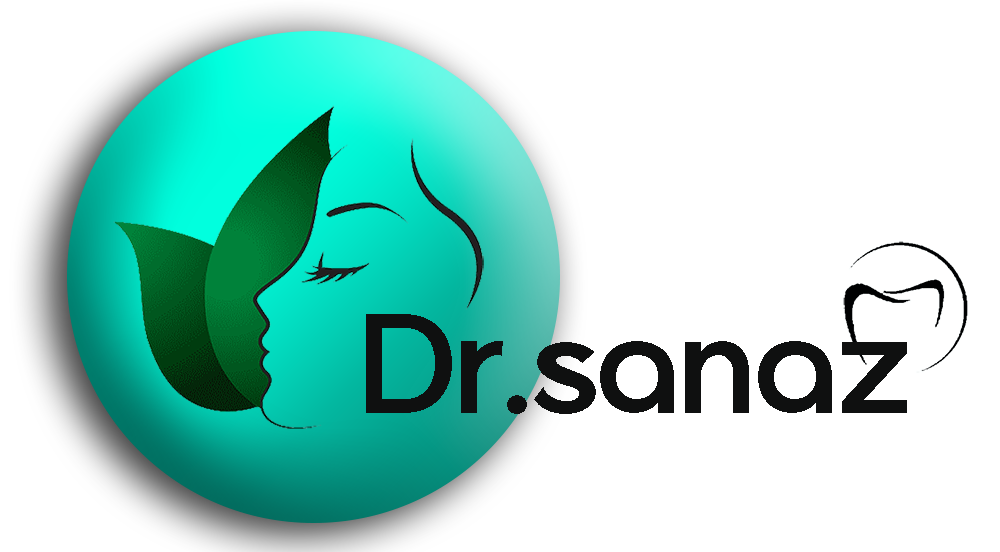
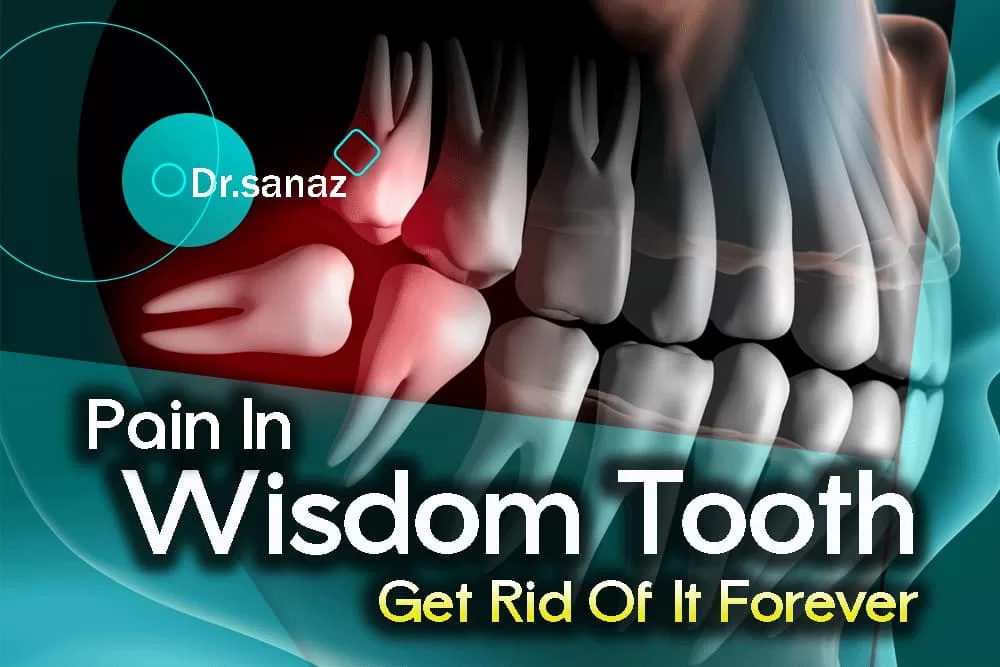
Pain In Wisdom Tooth - Get Rid Of It Forever
The pain of wisdom tooth infection (implanted wisdom teeth and semi-implanted wisdom teeth) is one of the main reasons people visit the dentist because almost all people have encountered this complication and take measures to treat their wisdom tooth pain.
The necessary measures are taken depending on the condition of the wisdom tooth and the amount of pain and infection.
In this article, we read:
- Types of wisdom teeth
- Symptoms of wisdom tooth pain
- Wisdom tooth surgery
- Some home remedies for wisdom tooth pain
Types of wisdom teeth:
- Partial wisdom tooth
- overgrown teeth
- wisdom tooth
- It may not exist at all
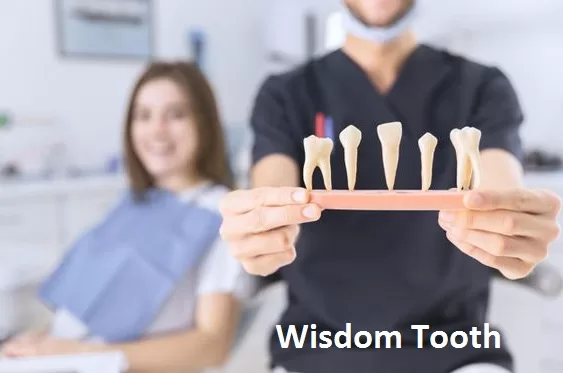
Symptoms of wisdom tooth pain
- Causing pain in the temporal joint, jaw, neck, lymph nodes, and ears
- Infection and inflammation of wisdom teeth, adjacent teeth, or gums
- Creating cysts or tumors
- It is not being able to open the mouth entirely and feeling stiff and painful when chewing food.
Where does wisdom tooth pain go?
One of the ambiguities that people sometimes face when dealing with wisdom tooth pain is the spread of pain, i.e., wisdom tooth infection and sore throat, buzzing and ear pain, i.e., the spread of pain in the mouth, jaw, ear, and lymph nodes. Wisdom tooth pain and infection can cause pain in the surrounding teeth, throat, or ear, so even this pain can be confused with the pain caused by a cold in the throat or ear.
Related “Tooth Infection Swelling“
In addition, wisdom teeth sometimes cause complications such as sinus problems, headaches, or pain in one area of the face.
Considering that the wisdom tooth is the last tooth that grows in the mouth, it may destroy the alignment of the teeth due to wear with the surrounding teeth; for this reason, in most cases in the orthodontic treatment of wisdom teeth due to the space they occupied, They must be removed to make room for the teeth to move in order to align them.
Related: “Treatment Of Tooth Infection Swelling“

Wisdom tooth gum pain
When a wisdom tooth erupts, due to the pressure exerted on the gums, the gums in the affected area become painful and swollen, which may be confused with other gum diseases; of course, the wisdom tooth does not have an external appearance when it erupts, and the dentist and jaw surgery specialist
The presence and eruption of the wisdom tooth (implanted wisdom tooth, semi-implanted, or erupted wisdom tooth) can be noticed only by observing the photograph or knowing the symptoms of wisdom tooth pain. Gum pain in the wisdom tooth or its swelling is one of these symptoms.
Of course, note that these factors are unique in each patient, and all complications are not felt in a person. The symptoms of wisdom tooth pain are different in each person. However, when one of these complications occurs, the dentist and specialist in Maxillofacial surgery recommend removing wisdom teeth as part of treatment.
It partially impacted wisdom teeth and swollen lymph nodes.
Suppose a semi-implanted wisdom tooth is in contact with the gums and causes food jam, damage, swelling, and infection of the gums; if there is no timely treatment and surgery and removal of the semi-implanted wisdom tooth, In addition to experiencing severe pain.
In that case, a person may have swollen lymph nodes. This complication is also possible when the wisdom tooth has fully erupted and if it is difficult for a person to access the wisdom tooth and the gums around it for cleaning.
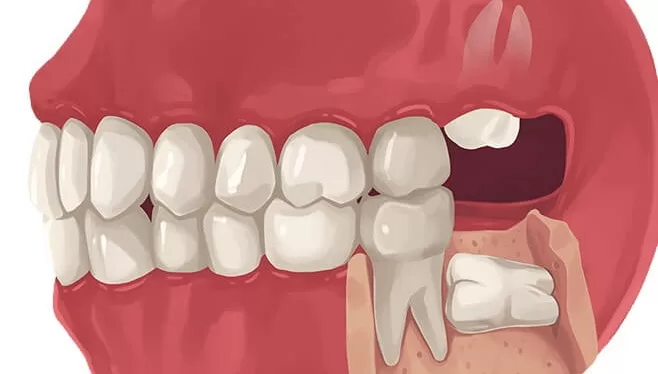
Under what conditions does a wisdom tooth not need to be pulled?
If the patient’s jaw has enough space for wisdom teeth to grow and the wisdom teeth are in place and fully grown (not hidden or partially hidden). Oral and wisdom teeth hygiene is regularly observed; there is no need to remove wisdom teeth, but the conditions of wisdom teeth and adjacent teeth should be checked regularly and annually.
In this situation, a person can use that tooth usefully and efficiently, although this condition rarely occurs.
Complications of not pulling out wisdom teeth that are embedded or semi-embedded:
If the wisdom tooth is semi-hidden or hidden, it brings pain and complications, and wisdom tooth surgery should be performed and the wisdom tooth removed. Because in addition to causing extensive pain, infection and swelling of gums and decay, and damage to other teeth also have other complications.
Semi-implanted teeth with protruding crowns cause gums abscesses, cellulitis, and cysts. Embedded teeth also have a follicular bag, which has changed into a cyst and a tumor over time. Over time, the created cyst becomes more extensive and causes many problems, and may even cause the loss of the jaw bone in more severe cases.
It can cause widespread damage and damage to the eyes. Therefore, it is better to remove the implanted or semi-implanted wisdom teeth before age 35 because the risk of developing cysts is higher at older ages.
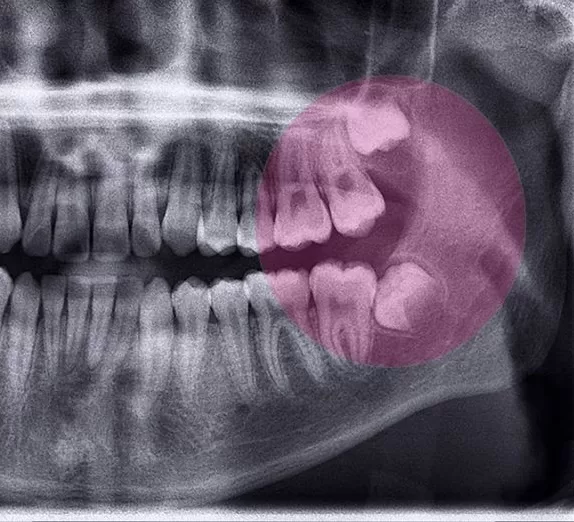
Wisdom tooth surgery
After the initial examination and examination of the condition of the patient and the wisdom tooth, local anesthesia is injected into the area of the jaw bone and gum tissue where the wisdom tooth is located. Moreover, it causes deep anesthesia in the treated area and the nerves.
Then the anesthesia test is done, and if needed, anesthesia is injected again for the patient. If the patient feels pain, Anesthesia is injected again during the treatment. Of course, the amount of anesthetic injection depends on the patient’s condition, including weight, age, and other factors.
At this stage, using low-power laser rays is also effective in speeding up the anesthesia process.
According to the type of wisdom tooth and how it is placed, the surgeon decides on the surgery and extraction of the wisdom tooth; Because the extraction of a hidden and horizontal wisdom tooth or a wisdom tooth with a crooked root will be different or the extraction of a wisdom tooth on a nerve or a wisdom tooth close to the sinus requires precision and skill.
Some home remedies for wisdom tooth pain
By using these methods for toothaches, you can relieve your pain temporarily, but note that, scientifically, none of these methods will relieve you of pain in the long run.
Related: “How Do I Know What Kind Of Toothache I Have?“
Use of numbing gel
Dental numbing gel can reduce the sensation of touch and severe pain. These gels contain benzocaine and can be applied directly to the affected gums during the day.
Ibuprofen
Ibuprofen is an over-the-counter pain reliever that helps reduce inflammation. It is a wisdom tooth pain reliever that may be the most effective so that a person can see a dentist for treatment.
Antiseptic properties of salt water
To rinse the mouth with salt water, a person can pour a few tablespoons of salt into a glass of boiling water. Once the water has cooled slightly, it can be swished around the mouth for a few minutes and then removed from the mouth; this process can be repeated twice or thrice throughout the day.
Oil or cloves for numbing
Cloves are a traditional remedy to numb the nerves; Put one or two drops of clove oil on a cotton ball and place it on the tooth that hurts.
Caution: Do not pour this oil directly into your mouth. Also, be careful not to spill the oil on your tongue or other parts of your mouth.
Related: “Top 10 Root Causes Of Dental Pain“


Using red pepper and ginger powder
Mix these two spices. This way, mix an equal amount of red pepper powder and ginger with water until a mixture with sauce concentration is created. Then apply some prepared mixtures on cotton, place it on the tooth that hurts, and wait until the pain subsides.
last word
As mentioned, the wisdom tooth pain spreads to different parts of the mouth, face, ears, and neck, and if you feel pain, you should have your wisdom tooth extracted or operated on. Because with home remedies for toothache, the toothache will be reduced temporarily, and the cause of the pain will remain.
Due to their complexities and conditions, impacted and partially impacted wisdom teeth, as well as wisdom teeth on the nerve, should be removed by a maxillofacial surgeon.
Share in :
Explore more


Points To Pay Attention To After Teeth Restoration- Drhealthandbeauty

